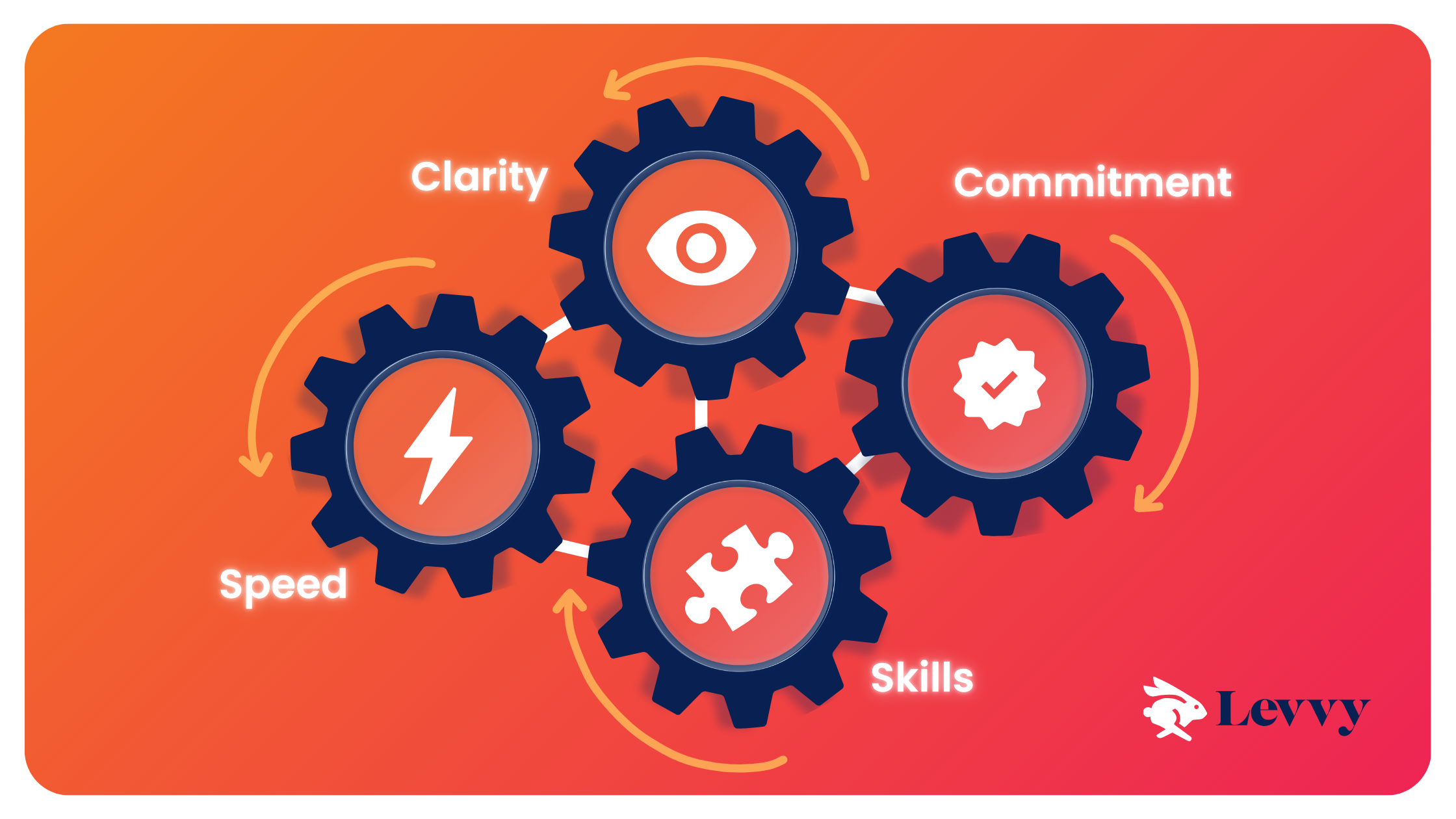Navigating Common Work Stressors: Workload Management Strategies for Better Mental Health and Productivity

We all expect technology to make our lives easier, especially at work. But let’s be honest, sometimes it feels like it just adds more to our plate. Instead of helping, the wrong tools can make dealing with deadlines, big to-do lists, and team collaboration even harder. This can lead to more stress, less sleep, and a real impact on our mental health.
This Mental Health Awareness Month, let’s address this issue head-on. We’re going to explore common workplace stressors and the best way to handle them. We’ll show you how Levvy isn’t just another piece of software—it’s a way to genuinely enhance your workday and reduce stress.
Let’s get back to what technology should do: make our work lives better.
Common Work Stressors
Context Switching
Imagine you’re working on a client’s monthly P&L when a client calls with a time-sensitive request to help them update someone’s work hours ahead of this week’s payroll.
We call this jumping from one task to another context switching. Frequently changing tasks lowers—productivity and increases stress as employees attempt to juggle various pieces of information all at once.
Strategies to Minimize Context Switching
Finding ways to minimize context switching and focus on tasks is essential for managing work-related stress. Here are some strategies to help:
- Create a daily and weekly priority list from most to least important
- Use dedicated blocks of time for specific types of work to deep dive into a particular task without interruption
- Turn off unnecessary notifications to limit distractions like social media
Levvy’s work management platform takes these strategies a step further. It organizes and prioritizes your tasks, reducing the need for frequent switches and helping you stay focused. Plus, Levvy’s all-in-one task modal consolidates everything you need to complete your work—including instructions, notes, resources, dependencies, and comments—into one neatly organized place.
Work Overload
When you have too many tasks on your plate, it can become overwhelming. If this keeps up, it can lead to burnout, where you feel drained and lose your motivation.
Strategies to Manage Workload
It’s important to recognize the signs of work overload and take proactive steps to prevent stress and burnout.
Some strategies to manage a heavy workload include:
- Regular breaks during workday to eat lunch, stretch, and get eyes off the monitor
- Set realistic work goals
- Set achievable deadlines and due dates
- Break tasks into smaller, more manageable parts
- Promote healthy work-life balance, ensuring downtime is part of your routine
Levvy helps keep your team’s workload balanced with features like transparent time budgeting and tracking. This clear visibility into each team member’s responsibilities allows you to evenly distribute tasks and adjust workloads as needed, ensuring no one gets overloaded.
By integrating these features with effective workload and time management strategies, you can prevent burnout and create a healthier work environment for everyone.
Poor Communication
Communication is the foundation of any successful and collaborative workplace. Without effective communication skills, a variety of challenges can arise for a company and its employees.
Poor communication in the workplace can cause confusion, frustration, anxiety, and stress among employees and management. Uncertainty about expectations, project deadlines, or a clear understanding of your role can cause stress.
Having too many communication channels, like emails and instant messaging apps, can make these problems worse. Without a consistent and contextual way to handle communication, employees may struggle to keep track of important information.
Out-of-Context Communication
What would you do if a partner or project manager sends you a Slack message asking you for an update? You’d probably ask, “Update on which project?” Out-of-context communication can create just as much confusion and stress in the workplace as poor communication.
Emails or instant messages that are not tied directly to a task or project are not only disruptive, but also lead to inefficiencies as members of your team require more time to sort out the confusion.
Strategies to Improve Communication
To prevent these issues , teams must prioritize clear and contextual communication.
Effective communication practices include:
- Regularly scheduled team meetings
- One-on-one check-ins
- Quarterly performance reviews
- Clear and streamlined collaboration tools
To streamline communication channels, Levvy offers a variety of tools that promote clarity and organization. Levvy’s contextual task modal and commenting features provide precise, focused communication within the framework of tasks, ensuring that important details are always linked to related work.
Insufficient Workplace Resources
Everyone works better when they have the right tools. If employees don’t have what they need to get the job done, it can lead to frustration, poor performance, and lower productivity. This not only makes day-to-day tasks harder but also leads to lower job satisfaction.
Strategies to Enhance Resources
Firms need to make sure everyone has the right tools to do their jobs well. Giving employees what they need boosts their productivity and how well they perform.
This should include:
- Updated, compatible technology and software
- Training programs
- Support from management and HR
- Effective communication & practice management tools
Identifying what’s missing and filling those gaps can make a big difference. Using practice and workflow management tools like Levvy can help everyone work better and stress less, which creates a happier workplace.
Lack of Autonomy
Lack of autonomy in the workplace happens when individuals have limited decision-making power in their roles.
Feeling restricted over work processes leads to decreased job satisfaction, motivation, and well-being. It leaves employees feeling boxed in, disinterested, and stressed about meeting the expectations of decision-makers.
Strategies to Promote Autonomy in the Workplace
Organizations can adopt various strategies to help employees gain more control and independence at work.
These strategies include:
- Allow More Employee Input. Employee input fosters a more open and inclusive work environment, where employees aren’t afraid to voice their opinions.
- Encourage Goal Setting & Personal Development Plans. Clear objectives motivate individuals to take ownership of their work and strive for personal growth.
- Build Trust and Reduce Micromanagement: Trust employees with responsibilities and give them the autonomy to complete tasks independently.
Levvy’s dynamic workspace promotes workplace autonomy by allowing employees more input in moving tasks and adjusting their schedule. To reduce micromanagement, Levvy provides employers with real-time visibility into ongoing progress and completed work. This allows managers to confidently delegate tasks while still keeping track of progress and outcomes, striking a balance between oversight and independence.
Address Work Stressors
Addressing work stressors is crucial for maintaining good mental health and productivity. By recognizing and managing common work stressors effectively, individuals can prevent burnout, anxiety, and other mental health issues.
Remember to always prioritize self-care just as much as work to maintain a healthy work-life balance in your life.


.png)
.png)
